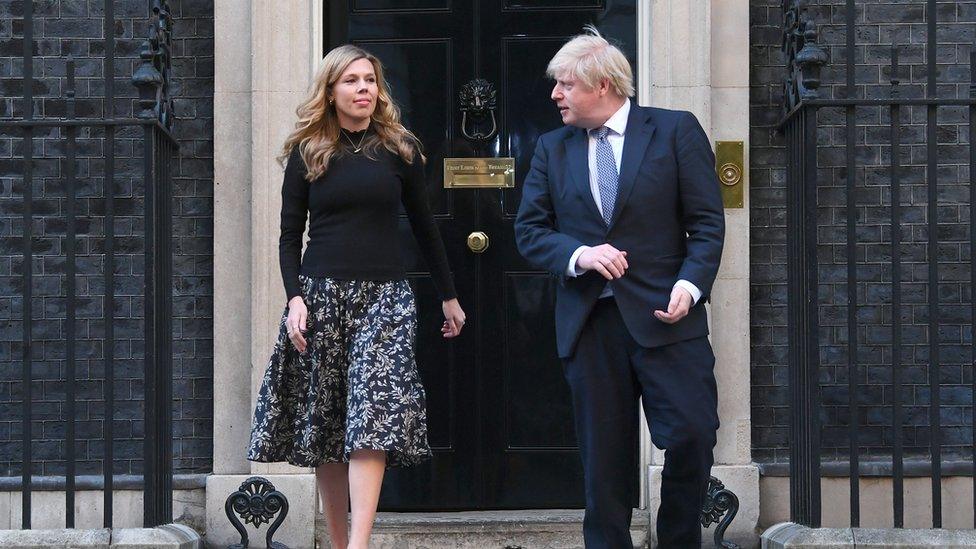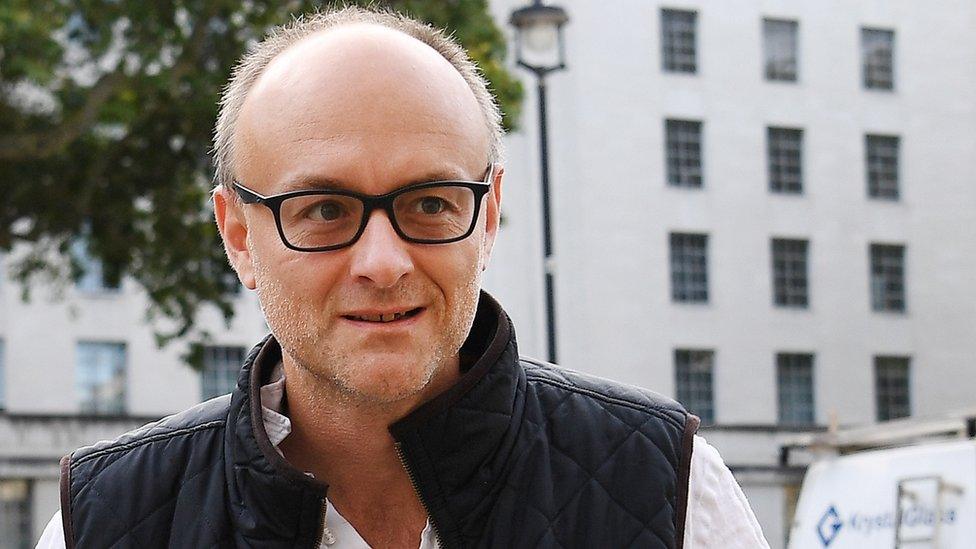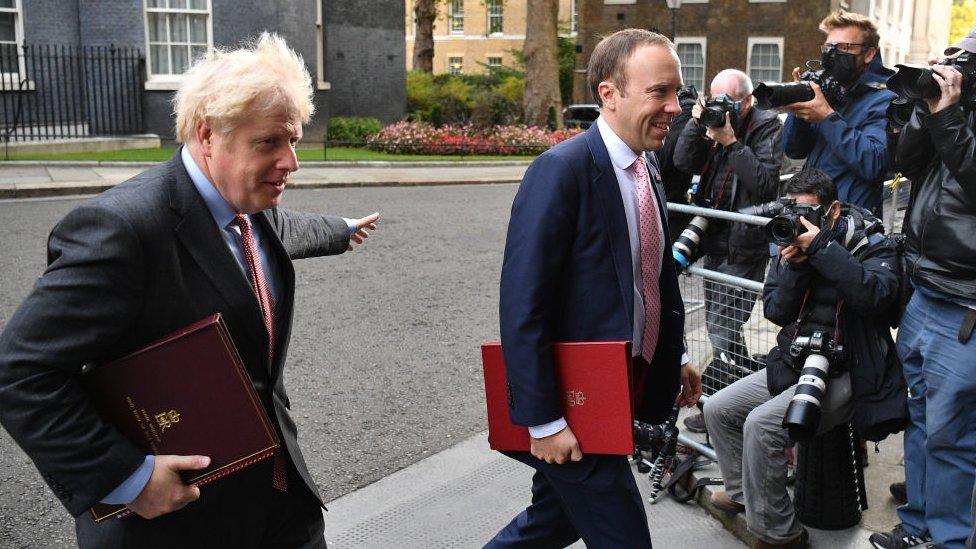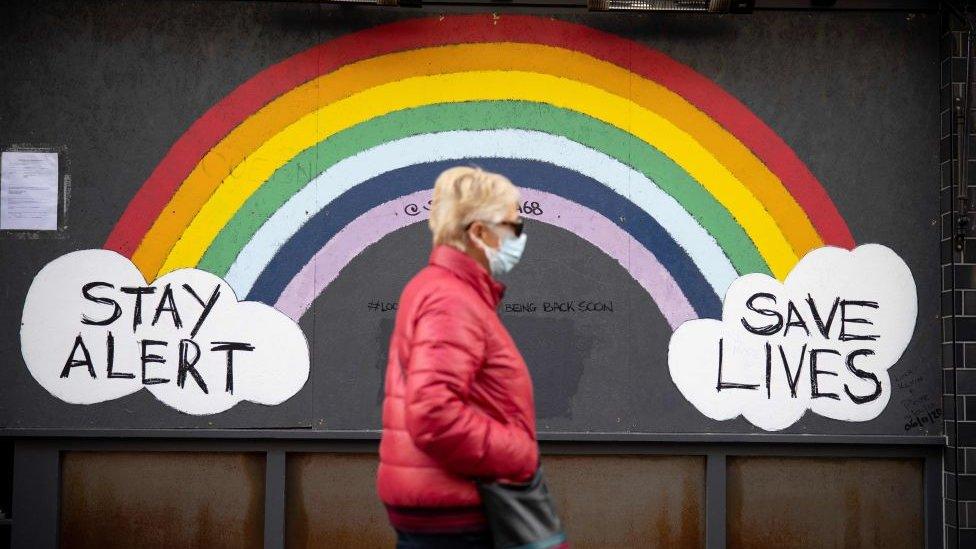Covid inquiry texts show No 10 staff complaining about Carrie Johnson
- Published

WhatsApp messages from 2020 released by the Covid inquiry have revealed senior civil servant Simon Case complaining about the influence of Carrie, the partner of then-PM Boris Johnson.
In exchanges with a Downing Street adviser at the time, Dominic Cummings, Mr Case jokes that Mrs Johnson was "the real person in charge".
In a later text Mr Case also says the government looks like a "tragic joke".
The messages came as the Covid inquiry heard evidence on political governance.
The screenshot of the WhatsApp group chat from autumn 2020, provided by Mr Cummings, was displayed on screen during a session in which the senior lawyer for the inquiry, Hugo Keith KC, was drawing attention to what he called "dysfunctionality" at the heart of government.
In a discussion about introducing regional circuit breakers, Mr Case writes: "Am not sure I can cope with today. Might just go home."
Lee Cain - Mr Johnson's head of communications - asks what "are we talking about".
"Whatever Carrie cares about, I guess," replies Mr Case.
He later adds: "I was always told that Dom [Cummings] was the secret PM. How wrong they are. I look forward to telling select [committee] tomorrow... don't worry about Dom, the real person in charge is Carrie."
"So true," Mr Cummings replies along with a laughing emoji.
Mr Cain agrees and adds that "she doesn't know [what] she is talking about either".
Mr Case goes on to say: "This government doesn't have the credibility needed to be imposing stuff within only days of deciding not too [sic]. We look like a terrible, tragic joke.
"If we were going hard, that decision was needed weeks ago. I cannot cope with this."
The messages were sent in autumn of 2020 - around the time the government was reintroducing some Covid restrictions in England.
Carrie Johnson was in a relationship with Mr Johnson before he became prime minister in 2019. They lived together in Downing Street and married in May 2021.
Throughout Mr Johnson's time in office, Mrs Johnson was target for criticism - particularly from Mr Cummings - a close adviser to Mr Johnson who later became a fierce critic.
Mr Case was a senior civil servant in No 10 until September 2020 when he was promoted to be head of the civil service.
During the session, the inquiry was also shown texts between Mr Johnson and Mr Cummings from March 2020 in which Mr Johnson describes the chief medical officer Sir Chris Whitty and chief scientific adviser Sir Patrick Vallance as "wonderful men... but they are both in new territory".

Mr Cummings was a close adviser of Boris Johnson until he quit his position in December 2020
Mr Johnson also describes Mark Sedwill, the head of the civil service until September 2020, as "miles off pace".
Mr Cummings replies that "the problem is CabOff [the Cabinet Office] and DHSC [the health department] haven't listened and absorbed what the models truly mean."
Separately, in an email sent to Mr Johnson in July 2020, Mr Cummings writes: "Current CABOFF [Cabinet Office] doesn't work for anyone - it is high friction, low trust, and obv many good parts but overall low performance."
Mr Keith KC warned the inquiry that "due caution must be applied to the accuracy of WhatsApps which lack nuance and can be intemperate, and also diary entries, which may not accurately reflect the reality of the position day by day and which indeed may have been drafted for a different audience."
He went on to suggest that the messages and other pieces of evidence, including diary entries and notes from Sir Patrick Vallance, demonstrated that factionality and infighting were prevalent at a time when the government was responding to the coronavirus pandemic.
Sir Patrick's notes were not displayed but Mr Keith said they showed "according to the Cabinet Secretary himself, this is in November 2020 so that would be Simon Case, No10 was at war with itself - a Carrie faction with [Michael] Gove, another with SPADs [special advisers], the PM caught in the middle."
The witness, former senior civil servant Alex Thomas, said that in the early period of the pandemic there "was an anxious and chaotic and sometimes divided situation between the Cabinet Office and Number 10".
Mr Keith suggested that: "In the early part of the pandemic, the early months, the dysfunctionality... was reflective of the system, the structures, that were in place.
"Latterly the dysfunctionality lay more in the personalities and their working relationships and indeed the people who were in government."
In the afternoon session, the inquiry heard from long Covid experts Professor Chris Brightling and Dr Rachael Evans.
They said they were shocked and disappointed by Mr Johnson's comments, written on an October 2020 report, in which he uses colourful language to dismiss the condition comparing it to "Gulf War Syndrome stuff".
Prof Brightling told the inquiry: "We don't know how much this influenced the activity from government, and what government then did.
"But you would expect if the prime minister's view was such it may well have had an influence on other people in government."
He added there was "very little" focus on the long-term consequences of Covid-19 until 2021 and opportunities to plan services and treatment were missed.
This second stage of the Covid Inquiry is examining political decision-making during the pandemic, from January 2020 until February 2022, including the timing and effectiveness of lockdowns and other social-distancing restrictions.
It is taking witness evidence in London until Christmas, before moving to Scotland, Wales and Northern Ireland to look specifically at the decisions made by administrations in those parts of the United Kingdom.
Mr Johnson will give evidence in person to the inquiry later this year, along with other ministers, advisers, civil servants and health officials.
Related topics
- Published3 October 2023

